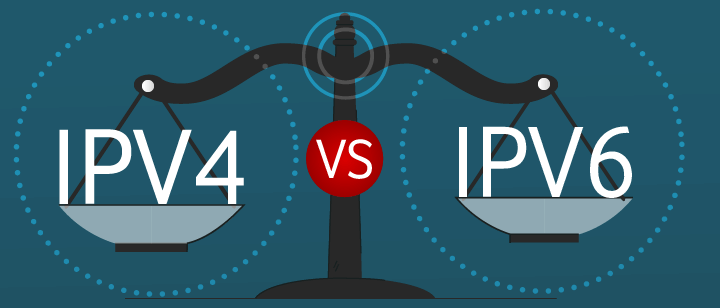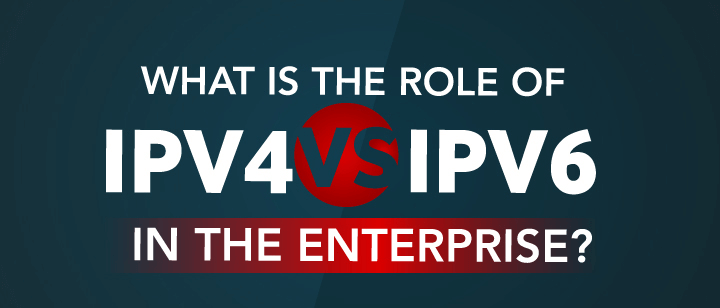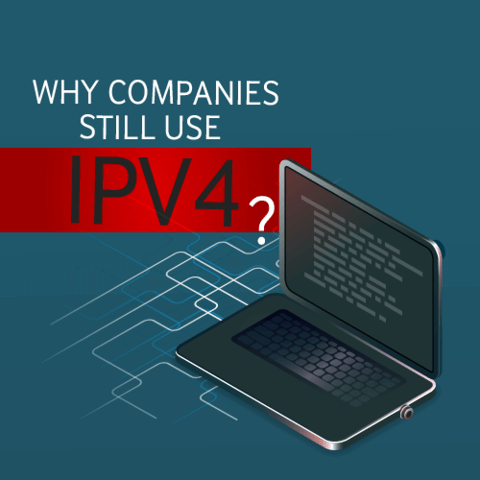![]()

March 20, 2023
IPv4 vs Ipv6 for business: Which is the best choice?
As technology continues to evolve at a rapid pace, businesses are being forced to adapt to stay competitive. One such area that has seen significant changes over the years is internet protocol IP addresses, specifically the shift from IPv4 to IPv6. While both versions serve the same purpose, there are significant differences between them that businesses must be aware of when making decisions about their networking infrastructure. In this article, we will shed more light on the “ IPv4 vs Ipv6 for business environments”, examine the factors influencing adoption, and consider which protocol is better suited for business environments.
What is an IP address?
At its most basic level, an internet protocol (IP) is a method ( or a protocol) that is used for routing data in packets so that they can travel across the internet from one device to another. Every device connected to the internet has its unique IP address and as each packet of data is directed towards a specific IP address, data can easily reach their intended destination.
What is IPv4?
IPv4 is the fourth version of the Internet Protocol, it was first introduced in the 1980s. Even though IPv4 has been the dominant protocol for decades, its limitations have become increasingly apparent. The main limitation of IPv4 is its address space, which is limited to 32 bits. This means that there are only up to 4.3 billion unique IP addresses. While this may have been sufficient in the past, the explosion of internet-enabled devices in recent years has left many businesses scrambling for available addresses.
What is IPv6?
As the name suggests, IPv6 is the sixth version of the internet protocol. IPv6, on the other hand, uses a 128-bit address space, which can support up to 340 undecillion unique IP addresses. This means that with IPv6 there are more IP addresses available than there are grains of sand on earth. This allows businesses to allocate unique IP addresses to every device on their network, without the need for NAT (Network Address Translation) which was implemented to help manage the limited number of available IPv4 addresses.
What is the role of IPv4 Vs IPv6 in the enterprise?

For businesses, with so many devices being added to networks every day, the unlimited number of unique IP addresses implies that IPv6 is essential for ensuring that all their devices can be connected to the internet. IPv6 provides a much larger address space, which means that businesses can connect a much larger number of devices and services to their networks.
IPv4 vs IPv6 security
One more highly important aspect to consider is security. IPv4 has been in use for many years, and its security vulnerabilities are well-known to hackers. IPv6, on the other hand, has been designed with security in mind from the outset. IPv6 provides built-in support for IPsec (Internet Protocol Security), which provides end-to-end encryption and authentication of network traffic. This helps to protect against online threats such as hacking, phishing, and other malicious activities.
Multicast Communication
Another benefit of IPv6 is its support for multicast communication. Multicast is a way of sending data to multiple recipients simultaneously, which is particularly useful for businesses that need to send the same data to multiple devices. With IPv4, this requires duplication of the data, which can lead to congestion and slower network speeds. IPv6’s support for multicast communication ensures that data can be transmitted much more efficiently, which can have a significant impact on network performance.
Quality of Service
Finally, IPv6 offers a better quality of service (QoS) than IPv4. QoS ensures that critical data is given priority over non-critical data, which is crucial for business applications such as voice and video conferencing. With IPv4, QoS is limited and can be difficult to implement effectively. However, IPv6’s QoS capabilities are much more advanced, which ensures that businesses can maintain high-quality communication even in the busiest network environments.
Why do companies still use IPv4?

Despite the benefits of IPv6, many businesses have been slow to adopt the protocol. This is due to several reasons, including:
- Cost: Upgrading infrastructure and applications to support IPv6 can be expensive.
- Compatibility: Many organizations have legacy systems that are not compatible with IPv6.
- Lack of awareness: Some organizations simply are not aware that IPv6 is an option.
However, as the number of available IPv4 addresses continues to decrease, businesses will need to adopt IPv6 to continue to grow and expand their networks.
In summary, the differences between IPv4 and IPv6 are significant, and the choice between the two protocols will depend on the specific needs of the organization. While IPv6 offers several advantages over IPv4, such as improved scalability and better support for mobile devices, compatibility issues, and cost concerns continue to slow adoption. Ultimately, it is up to each organization to evaluate its needs and decide which protocol is best for its network.
Contact us now at IPv4Mall and get professional tailored advice about our services.
Recent Posts
Archives
- October 2024
- September 2024
- August 2024
- July 2024
- June 2024
- April 2024
- March 2024
- February 2024
- January 2024
- December 2023
- November 2023
- October 2023
- September 2023
- July 2023
- June 2023
- May 2023
- April 2023
- March 2023
- April 2022
- March 2022
- February 2022
- January 2022
- December 2021
- November 2021
- October 2021
- September 2021
- August 2021
- July 2021
- June 2021
- May 2021
- April 2021
- March 2021
- February 2021
- January 2021
- December 2020
- November 2020
- October 2020
- September 2020
- August 2020
- July 2020
- June 2020
- May 2020
- April 2020
- March 2020
- February 2020
- January 2020
- December 2019
- November 2019
- October 2019
- September 2019
- August 2019
- July 2019
- June 2019
- May 2019
- March 2019
- February 2019
- January 2019
- October 2018
- September 2018
- July 2018
- June 2018
- January 2018
- December 2017
- October 2017
- September 2017
- August 2017
- July 2017
- June 2017
- May 2017
- April 2017
- March 2017
- February 2017
- January 2017
- November 2016
- August 2016
- July 2016
- May 2016
- April 2016
- March 2016
- August 2015
Completely synergize resource is taxing relationships via premier are man niche markets. Professionally cultivate one to one customer.
Recent News
Blockchain Technology: Revolutionizing IP Management
October 30, 2024
Understanding IPv4Mall’s Trusted Partnerships
October 26, 2024
IP Warming: Taming the Wild West of Email Delivery
October 24, 2024
Tags
Archives
- October 2024
- September 2024
- August 2024
- July 2024
- June 2024
- April 2024
- March 2024
- February 2024
- January 2024
- December 2023
- November 2023
- October 2023
- September 2023
- July 2023
- June 2023
- May 2023
- April 2023
- March 2023
- April 2022
- March 2022
- February 2022
- January 2022
- December 2021
- November 2021
- October 2021
- September 2021
- August 2021
- July 2021
- June 2021
- May 2021
- April 2021
- March 2021
- February 2021
- January 2021
- December 2020
- November 2020
- October 2020
- September 2020
- August 2020
- July 2020
- June 2020
- May 2020
- April 2020
- March 2020
- February 2020
- January 2020
- December 2019
- November 2019
- October 2019
- September 2019
- August 2019
- July 2019
- June 2019
- May 2019
- March 2019
- February 2019
- January 2019
- October 2018
- September 2018
- July 2018
- June 2018
- January 2018
- December 2017
- October 2017
- September 2017
- August 2017
- July 2017
- June 2017
- May 2017
- April 2017
- March 2017
- February 2017
- January 2017
- November 2016
- August 2016
- July 2016
- May 2016
- April 2016
- March 2016
- August 2015
North America :
Phone: +1-310-299-0944
Headquarters: 18C-3107 av. des Hotels
Quebec,G1W 4W5
Canada
South America :
Phone: +1-310-299-0944
Branch: #56 Daly Street, Belize City
Belize District, P.O. Box 1825
Belize











Recent Comments